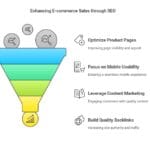
In today’s competitive digital landscape, search engine optimization (SEO) is more vital than ever. One of the most effective strategies for boosting your website’s visibility is leveraging semantic keywords. These are closely related terms and phrases that provide context and depth to your content, making it more relevant to both users and search engines. Let’s explore how to use semantic keywords to improve your rankings.
Understanding Semantic Keywords
Semantic keywords are not just synonyms of your primary keywords. They include variations, related terms, and concepts that help search engines understand the intent behind a query. For example, if your primary keyword is “fitness,” semantic keywords might include “exercise routines,” “workout tips,” or “health benefits of exercise.”
By integrating semantic keywords, you can:
- Enhance content relevance: Provide a more comprehensive answer to user queries.
- Improve user engagement: Keep readers on your page longer by addressing their needs.
- Increase search engine understanding: Help algorithms better match your content with search intent.
Steps to Effectively Use Semantic Keywords
1. Conduct Thorough Keyword Research
Begin by identifying your primary keywords using tools like Google Keyword Planner, Ahrefs, or SEMrush. Then, use these tools to uncover related semantic keywords. Analyze search volume, competition, and user intent to select the most relevant terms.
2. Analyze Search Intent
Understanding the intent behind a user’s search is crucial. Are they looking for information, making a purchase, or seeking navigation to a specific site? Align your content with these intents and use semantic keywords to address various angles of the topic.
3. Create Comprehensive Content
Write content that delves deeply into your topic, covering various aspects of it. For instance, an article about “healthy eating” might include semantic keywords like “nutrition tips,” “healthy recipes,” and “meal planning.” Use subheadings, bullet points, and examples to make the content engaging and informative.
4. Optimize Metadata
Incorporate semantic keywords into your title tags, meta descriptions, and header tags. For example, a title like “Top 10 Exercise Routines for Beginners” not only targets “exercise routines” but also implicitly aligns with “beginner fitness tips.”
5. Use Natural Language
Avoid keyword stuffing or over-optimization. Instead, integrate semantic keywords naturally within your content. Write conversationally, mimicking how users might phrase their queries.
6. Leverage Internal and External Links
Use internal links to connect related content on your site. For example, link an article on “weight loss diets” to a blog about “effective cardio exercises.” Additionally, include authoritative external links to boost credibility and provide additional context.
7. Utilize Structured Data
Schema markup helps search engines better understand your content. By tagging semantic keywords and related concepts, you can enhance your chances of appearing in rich snippets or knowledge panels.
8. Monitor and Refine
Track your rankings and analyze performance metrics like click-through rates (CTR) and bounce rates. Use these insights to refine your content and update semantic keywords as trends evolve.

Benefits of Using Semantic Keywords
- Higher Search Rankings: Content that comprehensively covers a topic often ranks higher.
- Better User Experience: Users find your content more helpful and engaging.
- Increased Traffic: Broader keyword coverage attracts a larger audience.
- Improved Authority: Demonstrating expertise and depth builds trust with both users and search engines.
Conclusion
Integrating semantic keywords into your SEO strategy is a powerful way to improve your rankings. By focusing on related terms and concepts, you can create content that resonates with your audience and satisfies search engine algorithms. Start implementing semantic keywords today, and watch your website climb the ranks while delivering exceptional value to your users.





